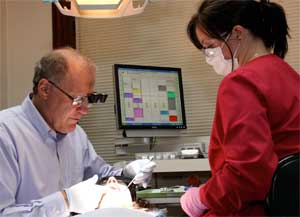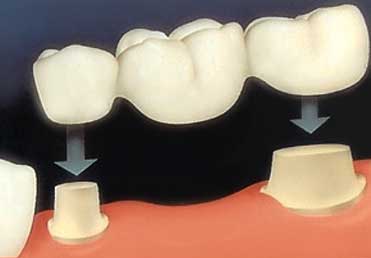Dental bridges are prosthodontic restorations designed to serve as replacements for a missing tooth or teeth.
Dental Bridges
They literally bridge the gap created by the loss of one or more teeth. Many clients choose to replace their removable partial dentures with cemented dental bridges because they are more comfortable and provide a more natural appearance.
Clients are typically very happy with the benefits provided by their dental bridges. Some of these benefits include:
- Restoring your smile
- Restoring your ability to properly chew and speak
- Maintaining the shape of your face
- Proper distribution of the forces in your bite by replacing missing teeth
- Preventing your remaining teeth from drifting out of position
A traditional dental bridge requires a support system
That is supplied by either crowned teeth or crowned, dental implants. The two supporting teeth or implants are called abutment teeth because they abut or border the gap created by your missing teeth. Natural-looking artificial teeth are custom made to bridge the gap in between. These artificial teeth, called pontics, are constructed from gold, alloys, porcelain, or a combination of these materials.
Each dental bridge is custom made
Dr. Becker custom-makes each dental bridge so that it fits snugly and comfortably in your mouth. Your dental bridge will not fall out and you cannot remove it by hand. You will be able to eat, speak, and smile with restored confidence. As with all of Dr. Becker’s cosmetic and restorative procedures, you can expect natural looking results and the highest quality craftsmanship.
Dr. Becker has compiled a list of his most commonly asked questions concerning dental bridges. We hope this section will answer some of your questions and give you a better understanding of what you can expect with this type of dental restoration.
Are There Different Types of Dental Bridges?
Yes, there are three major types of dental bridges:
Traditional dental bridges involve creating a dental crown for the tooth or dental implant on either side of the missing tooth, with a natural looking artificial tooth in between. Traditional dental bridges are the most common type of bridge and are made of either porcelain fused to metal or ceramics.
Cantilever dental bridges are used when there are adjacent teeth on only one side of the missing tooth or teeth.
Resin-bonded dental bridges are made of plastic teeth and gums supported by a metal framework. Metal wings on each side of the bridge are bonded to your existing teeth. A lot of the older bridges are resin-bonded. Traditional dental bridges are definitely superior.
Read More . . .
What Is the Process for Getting a Dental Bridge?
First, the abutment teeth are prepared. Preparation involves re-contouring these teeth to provide room for your crowns to be placed properly. Once this is completed, impressions of your teeth are made that serve as a model. This model serves as a customized template from which your bridge, pontic, and dental crowns are made. Dr. Becker will make a temporary dental bridge for you to wear while you are waiting for your permanent structure.
Next, your temporary bridge is removed and your new permanent bridge is checked and adjusted to achieve a proper fit. Additional visits may be required to check the fit and bite. This is dependent on each client's case.
How Long Do Dental Bridges Last?
Dental bridges can last up to 15 years and even longer. With good oral hygiene and regular checkups, it is not unusual for the life span of a fixed bridge to be well over 10 years.
Is It Difficult to Eat With a Dental Bridge?
Replacing missing teeth with a dental bridge should actually make eating easier. Dr. Becker recommends that until you become accustomed to your bridge, eat softer foods and cut your food into smaller bite-sized pieces.
Will the Dental Bridge Affect My Speech?
It is difficult to speak clearly when teeth are missing in the anterior (front) areas of the mouth. A dental bridge fitted properly with anterior teeth should help you speak properly.
How Do I Care For My Dental Bridge?
It is important to keep your remaining teeth healthy and strong as the success of the bridge typically depends on the strength of your abutment teeth. Following Dr. Becker’s dental health care plan and scheduling routine teeth cleanings are necessary for proper dental maintenance. Dr. Becker also suggests that you engage in a balanced diet for proper nutrition.
Hide . . .
If you have any further questions about dental bridges, please call Dr. Becker’s office at 206.542.4848.



